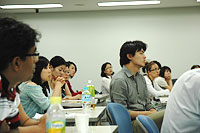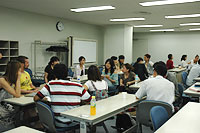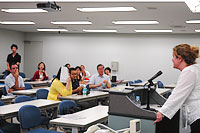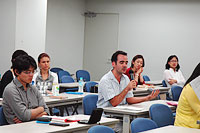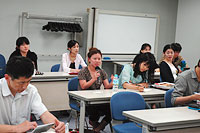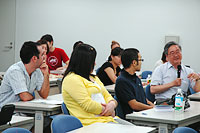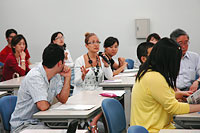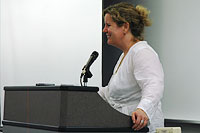社会統合とネットワーク
研究:セミナー・ワークショップ
GIARI “アジアの人権ガバナンス” セミナー
“子どもに対する犯罪: アジア太平洋におけるより一層の人権アドボカシーの必要性”
2009.07.15
“子どもに対する犯罪: アジア太平洋におけるより一層の人権アドボカシーの必要性”
ジーン ゲラン(Ph.D.)
レガタム研究所(ロンドン)
元米国務省政策立案スタッフ
・日時:2009年7月15日(14時45分〜16時15分)
・場所:19号館710号室
(事前予約不要)
・世話人:勝間靖(早稲田大学大学院アジア太平洋研究科教授)
・言語:英語(同時通訳なし)
主催:GIARI“アジアの人権ガバナンス”研究会
共催:WIAPS“開発と人権”研究部会/WOJUSS“国際協力”研究部会
ポスター[3017KB]
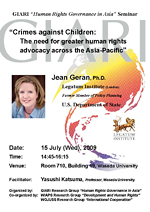
Summary
- Title: Crimes against children: The need for greater human rights advocacy across the Asia-Pacific
- Presenter: Jean Geran,Ph.D. (Legatum Institute in London)
- Date: 15 July (Wed), 2009
- Location: Room710, Building19, Graduate School of Asia-Pacific Studies, Waseda University, Nishi-Waseda, Tokyo
- Facilitator: Yasushi Katsuma, Professor, Waseda University
Presentation
In this lecture, Ms. Jean Geran highlighted human rights violations, human trafficking issues in Asia (her specialized field), and active human rights advocacy across the Asia-Pacific. Human rights advocacy has many levels of actors, including local social networks, NGOs, national governments that have institutional powers to access this issue by making new legislation or policies for human rights and executing the rule of law, and organizations from the international community such as the UN. The international community can play a positive role in placing pressure on a country where human rights violations are often ignored or are even legitimated by government. As approaches regarding human rights advocacy are significantly different between countries, Geran focused on Burma, where severe threats to humanity continue under the military regime, and Japan, whose responsibility for human rights advocacy in domestic and regional systems is expected.
In Burma, as well as trafficking of women, girls and children, there is sexual violence and forced labor including child soldiers. These occur mainly in the heavily militarized zones of the eastern border regions which are inhabited by many displaced persons, refugees and exiles forced there by the military oppression of the democratic movement. Crimes against humanity are, in part, political issues of democracy and security, so the role of the Security Council in taking action regarding crimes against humanity is important. Geran pointed out that the cooperation of countries through economic sanctions or through the embargo against Burma should be carried out more effectively.
Regarding Japan, Geran claimed that the government has carried out a lot of good work in giving development assistance, funding the UN to act for humanity, and legislating on the protection of women and child rights. Thus, it is expected that Japan has a lot to offer as a regional leader in promoting democracy and human security. Japan could use its political diplomatic pressure even more effectively, especially with regard to the transnational issues of human trafficking and the commercial exploitation of children across borders in which Japan is involved. There is a gap between demand and supply sides, so many levels of human rights advocacy and tools are needed.
Discussion (student groups)
How can we carry out human rights advocacy and how can we take advantage of political will to push our agenda?
Question and Answer Session
Question:
What will attract the attention of the younger generation to new problems of human rights?
Answer:
In the U.S. using social networks and new technology is probably an effective way, but each tool will be different in each country. For example, in U.S. high schools teachers show films to students as part of human rights education. Organized activities are important and young people's relationship based connections are changeable. Using the internet is also powerful. Because the younger generation wishes to change the world, they are active.
Question:
There are no active religious or church-like organizations in Japan. What will put pressure on Japan to change the situation for humanity? For instance, the situation had not changed for a long time, but when the U.S. ruled Japan after the war, Japanese government attitudes toward human trafficking issues changed. External pressure would be effective in Japan.
Answer:
In the U.S. internal policy-making structure, the reporting of trafficked persons from around the world is the most powerful tool that we, the state department, have. Based on this, what kind of sanctions should be imposed, how to get attention from many people and local governments, and what new legislation should be passed are considered. Drafts come through embassies at a regional level and NGOs participate to articulate reports. But human rights issues are sensitive for each country. Sensitive
negotiations between the U.S. and Japan take place because they are strong allies, and the U.S. values its bilateral relationship with Japan. We can get the attention of Japan or ask another country to make changes, because there is an effective advocacy system inside these different places.
Question:
At three different levels; local, regional and global levels respectively, how can advocacy tools address Burma's situation effectively?
Answer:
For thinking about advocacy from different actors' perspectives, I think that access at all of these different levels is hugely important to approach. Trying to move a country or situation into a better one, Asia is always focused on Burma. The international community as a whole is trying to get Asia to do more or say more, to take more constructive engagement or more sanctions, but it's a kind of frustrating exercise, too. Asia did not have any human rights mechanisms for a long time. However, Asia agreed to a New Charter, yet it is still not effective until Asia complies with the Charter. There has been no access to Burma for the UN after the cyclone. But efforts to support the democratic movement and to release political prisoners and democratic leader Aung San Suu Kyi continue, including various UN offers. Another mechanism is through the UN Human Rights Council, which each country can address. Strong reports on human rights can become diplomatic pressure. But these are not enough. However, the Security Council's actions can focus attention on the situation, because Burmese people are basically terrified and so cannot voice their opinions. China can provide internal pressure and support, and its role needs to be recalculated more positively, in addition to other members of Security Council and other Asian countries. All of these are important, because the situation changes and is dynamic. The international community is the most effective channel.
写真

